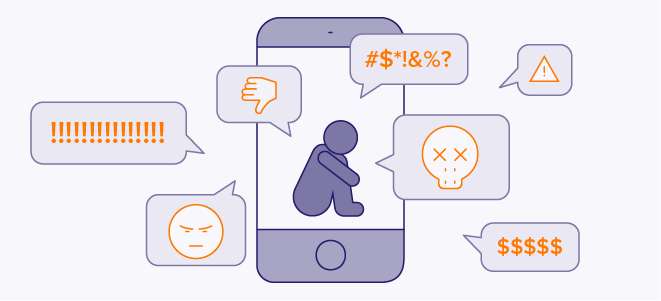With the widespread adoption of the Internet and social media, almost no one is immune to the phenomenon of cyberbullying, an epidemic that takes many forms under the guise of mockery, vitriol, defamation, and freedom of expression.
Cyberbullying is a type of abuse which has arisen recently, spreading widely because it includes sharing or exchanging personal photos and/or videos and making recipients vulnerable to insult and embarrassment. Cyberbullying is defined as the deliberate, repetitive, and hostile use of the Internet and related modern technologies with the intent of causing harm to others.
Cyberbullying makes use of digital technologies such as social media, messaging platforms, gaming platforms, and mobile phones. It is a repeated way of intimidating, provoking, or discrediting those at whom it is targeted.
With the increased availability of the Internet for a variety of transactions and its users coming from all levels of society, cyberbullying has developed various forms over time. These include spreading lies about someone, posting them on social media, sending malicious messages or threats to individuals via messaging platforms, or sending offensive messages to others, using unauthorized and illegal network access to harm others, spying on people using privacy-invading applications, corruption and misappropriation of intellectual property rights, and corruption and misuse of information.
The dangers of cyberbullying outweigh the dangers of traditional bullying, because the perpetrator is often unknown to the victim. Once available on the Internet, the material can spread widely without spatial or temporal limits, implying that cyberbullying has no time limit.
As readers, we can ask ourselves who the bullies are. Someone who is filled with hatred for others can be described as a bully, causing him to work to harm them in many ways. He can hurt their feelings or belittle them, which can lead to the subject being physically assaulted, and he can spread rumours around them to undermine their sense of security.
Finally, the Internet and the Information and Communication Technology revolution have provided us with opportunities that would not have been possible without their presence. They have become an essential part of all our lives but must be used in a balanced manner in a culture of respect and mutual understanding. The application of communication standards to which everyone adheres has become especially important with the emergence of the coronavirus, Covid-19. Widespread lockdown and the avoidance of personal contact has resulted in even greater expansion of the use of social media platforms, emphasizing the need for education and awareness of the dangers of cyberbullying. Legislation and punishing cyberbullies by preventing them from using the network may limit the abuse of society, institutions, and individuals alike.

By: Dr. Reem Nasser Al-Kaabi
Assistant professor
University of Bahrain

